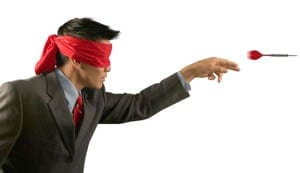 When it comes to interviewing candidates (and evaluating employee performance), most of us look into the mirror and hope we see someone like us looking back. The only logical question then is: how’s that working?
When it comes to interviewing candidates (and evaluating employee performance), most of us look into the mirror and hope we see someone like us looking back. The only logical question then is: how’s that working?
For most companies, the ready answer is it’s not. That doesn’t mean management completely ignores the problem. Valiant attempts (and expensive investments) to improve the process are noble but misleading. Better interview questions, more structured formats, and even training help improve the process but results still fall short. One fatal flaw remains and few companies seem willing to address it. As Pogo, said “we’ve met the enemy and it is us!”
The inherent vulnerabilities of the interview as the cornerstone of any selection process are old news. Even the structured behavioral interview provides only minimal improvement given its variables: the interviewing skills of the manager, the savvy of the candidate, and the interview questions asked.
But once and for all new research seems to put to rest why the job interview-the one big constant in the hiring process-is imprecise and defective. If a company is serious about identifying potential and evaluating future performance, it must address and fix the interview.
“People are horrible at predicting the future,” says Tom Rauzi, director of global talent at Dell Inc., in a recent WSJ article.
Like Dell, companies are scrambling to hire and promote better. Our ability to predict potential and assess performance is under intense scrutiny…and rightfully so. After pointing the finger anywhere but at ourselves, the elephant in the room is finally exposed. Personal bias is the enemy.
As it turns out, most employers currently rely on managers’ judgment and gut instinct to determine who gets hired or placed on the high-potential track. When they interview and evaluate they want to look into the mirror and see a reflection of themselves. But multiple surveys and studies reveal that only half of the candidates work out. Even a trained and experienced manager’s evaluation of another’s performance is tainted with some personal bias.
This inability to fairly and objectively rate others is known as the Idiosyncratic Rater Effect (IRE). IRE affects reliability by injecting a hiring manager’s beliefs and idiosyncrasies into the process, thereby canceling his or her ability to evaluate actual skills related to job performance.
 Thanks to our bias, it seems we are trying to hit the talent bullseye with one eye closed while standing in a deep fog. Research reveals that 61 percent of our rating of another reflects more about ourselves than the candidate or employees, since we base our rating on how much of a particular skill/value/behavior we think we have. If we believe we are highly skilled then we tend to rate most others just average. Likewise we devalue the importance of skills we lack. But our beliefs may have nothing to do with what really drive success or what skills are most important.
Thanks to our bias, it seems we are trying to hit the talent bullseye with one eye closed while standing in a deep fog. Research reveals that 61 percent of our rating of another reflects more about ourselves than the candidate or employees, since we base our rating on how much of a particular skill/value/behavior we think we have. If we believe we are highly skilled then we tend to rate most others just average. Likewise we devalue the importance of skills we lack. But our beliefs may have nothing to do with what really drive success or what skills are most important.
Unfortunately our people-performance decisions are driven by who we are, not by who the candidate is, which makes us poor evaluators of job fit and potential.
Hiring mistakes are costly, and companies are figuring that out. The research only confirms our inability to accurately and fairly assess candidate potential and employee performance.
At the same time, the research offers hope.
Companies have come to realize the cost of hiring mistakes has sky-rocketed. To that end, many now utilize pre employment tests for selection, and personality and competency assessments for development, mainly because they add objectivity to what they know is a vulnerable talent-management process. These assessments reduce bias and add numerous data points to help employers make the best talent decision possible. There is no single silver bullet for determining strengths or concerns, or for reducing potential poor performance. Pre-employment and career testing, however, serve the process well by providing the most reliable, unfiltered view.
